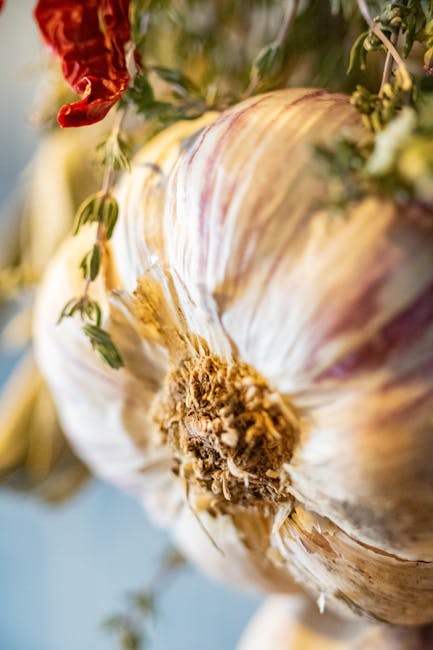From Ancient Wisdom to Modern Medicine: The Role of Antiviral Herbs
Introduction to Antiviral Herbs

Antiviral herbs have been used for centuries in traditional medicine to combat viral infections and promote overall health. These natural remedies offer a wealth of benefits in modern medicine, including immune support, antiviral properties, and potential therapeutic applications. Let's explore some of the most powerful antiviral herbs and their roles in promoting wellness.
Overview of antiviral herbs and their historical significance
Antiviral herbs have a long history of use in various cultures around the world, dating back to ancient times.
Benefits of using antiviral herbs in modern medicine
Antiviral herbs provide numerous advantages, such as boosting immune function, reducing inflammation, inhibiting viral replication, and promoting overall well-being.
Echinacea: An Immune-Boosting Herb
Echinacea is renowned for its immune-boosting properties and has been used for centuries to prevent and treat viral infections.
Echinacea: Properties and mechanisms as an antiviral herb
Echinacea contains active compounds like polysaccharides and flavonoids that stimulate the immune system and inhibit virus multiplication.
Uses of Echinacea in preventing and treating viral infections
Echinacea can be used as a preventive measure against viral infections, as well as a complementary treatment option for respiratory illnesses like colds and flu.
Elderberry: A Potent Antiviral Plant
Elderberry is a powerhouse when it comes to fighting off viruses due to its unique nutritional profile and antiviral properties.
Elderberry: Nutritional profile and antiviral properties
Rich in antioxidants and flavonoids, elderberry exhibits strong antiviral effects by blocking virus entry into cells and inhibiting viral replication.
Application of elderberry in combating colds and flu
Elderberry supplements or syrups can help alleviate symptoms and shorten the duration of colds and flu by boosting the immune response.
Garlic: Nature's Antiviral Powerhouse
Garlic is a versatile herb known for its potent antiviral effects, attributed to its sulfur-containing compounds like allicin.
Garlic: Active compounds and antiviral effects
Allicin in garlic has been shown to interfere with viral replication, inhibit viral enzymes, and strengthen the immune system against viral invaders.
Effective ways to incorporate garlic for antiviral benefits
Adding fresh garlic to meals, taking garlic supplements, or using garlic extracts can provide antiviral support and enhance overall health.
Ginger: A Versatile Antiviral Spice
Ginger possesses remarkable antiviral properties and offers a wide range of health benefits due to its bioactive components.
Ginger: Antiviral properties and health benefits
The bioactive compounds in ginger, such as gingerol and shogaol, exhibit potent antiviral activity and can also aid digestion and reduce inflammation.
Utilizing ginger for antiviral support and immunity
Consuming ginger tea, adding grated ginger to dishes, or taking ginger supplements can help support immunity and protect against viral infections.
Conclusion
Antiviral herbs have played a significant role in traditional medicine for centuries, offering natural alternatives for preventing and treating viral infections. Harnessing the power of these herbs in modern healthcare provides promising prospects for improving overall wellness and combating viral diseases.
Harnessing the power of antiviral herbs in modern healthcare
Integrating antiviral herbs into mainstream medicine can provide additional treatment options and potentially reduce the reliance on synthetic drugs.
Future prospects and research on antiviral herb applications
Continued research into the efficacy, safety, and optimal usage of antiviral herbs will further expand our understanding and utilization of these natural remedies in healthcare.
Overview of antiviral herbs and their historical significance
Antiviral herbs have been used for centuries in various cultures, harnessing their historical significance as natural remedies for viral infections.
Benefits of using antiviral herbs in modern medicine
Antiviral herbs offer numerous benefits in modern medicine, including their ability to boost the immune system, fight viral infections, and potentially reduce the risk of drug resistance. They provide a natural and alternative approach to traditional antiviral medications.
Echinacea: An Immune-Boosting Herb

Echinacea is a powerful herb known for its immune-boosting properties, making it an effective antiviral remedy. It activates immune cells, enhances their function, and helps fight off viral infections.
Echinacea: Properties and mechanisms as an antiviral herb
Echinacea is known for activating immune cells and enhancing their function, making it a powerful antiviral herb in fighting off viral infections.
Uses of Echinacea in preventing and treating viral infections

- It activates immune cells, enhancing their function in fighting off viruses.
- Echinacea can help reduce the severity and duration of viral infections such as colds and flu.
- It is believed to stimulate the production of interferon, a protein that inhibits viral replication.
- Echinacea can be taken in various forms, including capsules, tinctures, and teas, for maximum effectiveness.
Elderberry: A Potent Antiviral Plant
Elderberry, a potent antiviral plant, is rich in nutrients and exhibits strong antiviral properties. It can be used to combat colds and flu by boosting the immune system and reducing the severity of symptoms.
Elderberry: Nutritional profile and antiviral properties
Elderberry is a powerhouse of nutrients, including vitamins A, B, and C, as well as antioxidants and flavonoids. Its antiviral properties make it effective in fighting colds and flu.
Application of elderberry in combating colds and flu

Elderberry can be used to combat colds and flu due to its antiviral properties. It can be consumed as a syrup, tea, or supplement.
Garlic: Nature's Antiviral Powerhouse

Garlic is a potent antiviral herb, containing active compounds that can help boost immunity and fight off viral infections. Incorporate garlic into your diet by adding it to dishes or taking garlic supplements for maximum antiviral benefits.
Garlic: Active compounds and antiviral effects
Garlic contains active compounds that possess antiviral effects. These compounds, such as allicin and sulfides, help boost immunity and fight off viral infections. Incorporate garlic into your diet for maximum antiviral benefits.
Effective ways to incorporate garlic for antiviral benefits

There are several effective ways to incorporate garlic into your diet for maximum antiviral benefits, such as adding it to soups, stir-fries, or salad dressings, or simply consuming it raw.
Ginger: A Versatile Antiviral Spice

Ginger, known for its antiviral properties, can be used to boost immunity and combat viral infections. Incorporate ginger into your diet by adding it to teas, soups, or using it in marinades and sauces.
Ginger: Antiviral properties and health benefits

Ginger, with its antiviral properties, offers numerous health benefits. Incorporate ginger into your diet through teas, soups, marinades, and sauces to boost immunity and combat viral infections.
Utilizing ginger for antiviral support and immunity

Utilize ginger for antiviral support and immunity by incorporating it into your diet through teas, soups, marinades, and sauces to boost your immune system and combat viral infections.
Conclusion
Harness the power of antiviral herbs in modern healthcare by incorporating them into your daily routine. Boost your immune system and protect against viral infections with the use of echinacea, elderberry, garlic, and ginger. These natural remedies have been used for centuries and can provide effective support for your overall health and well-being. Explore different ways to incorporate these herbs into your diet, such as through teas, supplements, or in cooking. Remember to consult with a healthcare professional before starting any new herbal regimen. Take control of your health and harness the power of nature's antiviral herbs today.
Harnessing the power of antiviral herbs in modern healthcare

Harness the power of antiviral herbs in modern healthcare by incorporating them into your daily routine. Boost your immune system and protect against viral infections with the use of echinacea, elderberry, garlic, and ginger. These natural remedies have been used for centuries and can provide effective support for your overall health and well-being. Explore different ways to incorporate these herbs into your diet, such as through teas, supplements, or in cooking. Remember to consult with a healthcare professional before starting any new herbal regimen. Take control of your health and harness the power of nature's antiviral herbs today.
Future prospects and research on antiviral herb applications
Future prospects and research on antiviral herb applications involve exploring their potential in developing new treatments, enhancing existing therapies, and understanding their mechanisms of action. Ongoing studies aim to uncover the specific antiviral properties and identify optimal dosages for maximum effectiveness. Researchers are also investigating the potential synergistic effects when combining different antiviral herbs. This research is crucial for expanding our knowledge of herbal medicine and integrating it into mainstream healthcare. By continuing to explore the possibilities of antiviral herbs, we can unlock their full potential in modern medicine and improve patient outcomes.

Comments
Post a Comment